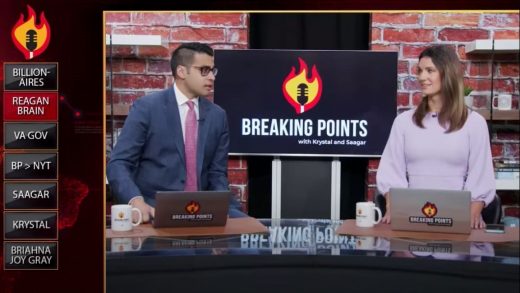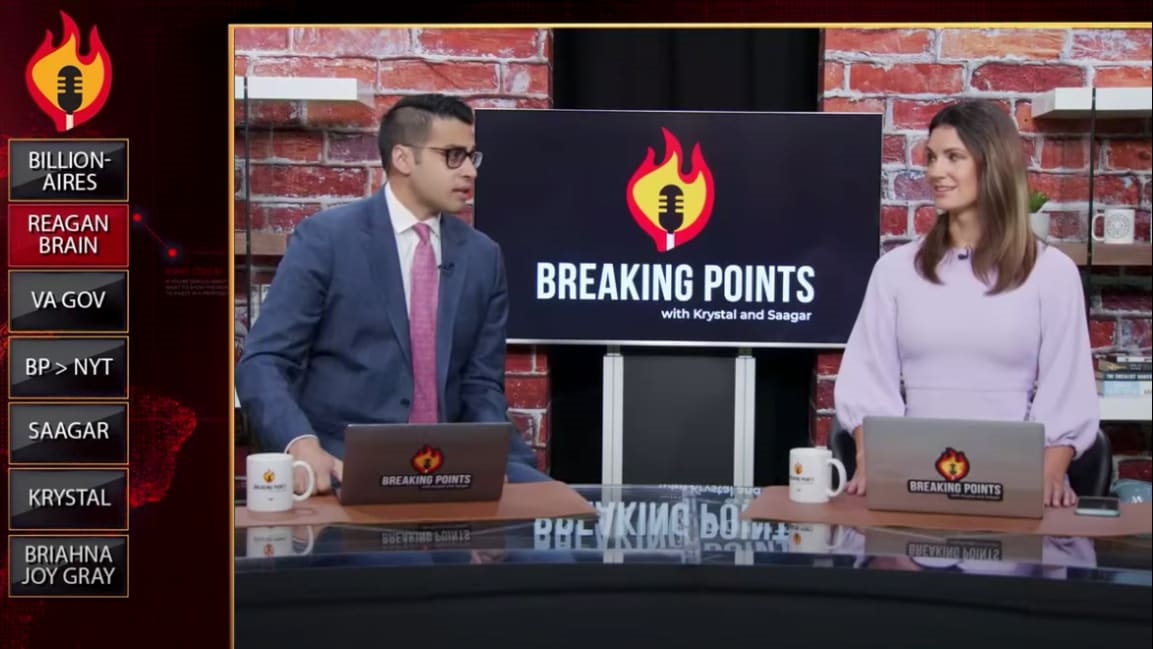Why ‘Breaking Points with Krystal and Saagar’ became the number-one political podcast in a week
The podcast charts got an unlikely trouncing this week, from the audio version of just-launched political talk show, Breaking Points with Krystal and Saagar.
What makes this victory over tops shows like The Daily, The Ben Shapiro Show, and Pod Save America unlikely is Breaking Points’ total independence—both in terms of major media backers and, ostensibly, partisan agendas. Hosts Krystal Ball and Saagar Enjeti were convinced that a unity ticket of credible pundits from across the divide could command a vast audience, even without the imprimatur or budget of an established publication. The market has quickly proved them correct.
“What are we doing here? We want to make people hate each other less and hate the ruling class more,” Enjeti says at the top of the premiere episode, succinctly summarizing the show’s premise.
He and his cohost are well suited for the mission. Ball is a former MSNBC pundit who was too lefty for the network, while Enjeti is the populist Tucker Carlson protégé who was too anti-Trump for The Daily Caller. Together, they hosted The Hill’s internet morning show, Rising, for the past two years, grabbing enough viewers to net a book deal just in time for the presidential election. (True to form, The Populist’s Guide to 2020 is probably the only book in existence endorsed by both Carlson and Nina Turner.)
In late May, Ball and Enjeti announced they were leaving Rising and The Hill to build something of their own. They wanted a well-produced internet morning show (and podcast) unbeholden to any corporate interests, which they view as the ruination of most, if not all, major media ventures. The resulting audience-funded Breaking Points was already a success when it launched Monday, June 7. The hosts had previously announced, in a giddy welcome video, 40,000 subscribers to the YouTube channel in just the first two days after the show’s announcement. By Friday, they were up to 285,000.
More than the latest evolution of the Crossfire format, the show hits like a positive version of horseshoe theory, the political-science idea that the far left and far right eventually come to resemble one another. Ball and Enjeti want to help their non-overlapping fans to look past their differences and focus their ire on the forces that pit them against each other—namely, in their estimation, the establishment—rather than fight each individual culture war battle that perpetuates this division.
The two sides occasionally joust on the show. Ball will hit Enjeti with an “I don’t know that I really buy that” after one of his asides, and he will give her a sideways glance after one of hers. They obviously share a mutual respect, however, along with a laser focus on their common targets.
As carefully as they must have planned the rollout, the pair could hardly have chosen a better news week for it. President Obama avoided answering most of the questions in an interview with Jewish Insider just before launch, providing ample excuse for Ball and Enjeti to air out their issues with the former commander-in-chief. Jeff Bezos, another public figure who has earned the hosts’ mutual disdain, helped provide two distinct rants this week—first with his Blue Origin mission to space, possibly at taxpayers’ expense, and then with ProPublica’s IRS bombshell story, which showed how little Bezos and three other billionaires paid in taxes over the last decade. The latter story also featured an ideal talking point for uniting the hosts’ seemingly fractured audiences: the fact that the Biden administration’s response to it was an enraged promise to . . . find the source of the IRS leak, rather than correct or even address the economic imbalance exposed by it. This take is exactly where progressive and conservative interests meet, and the hosts use it to cut through the cultural quagmire and reach a wide audience of unlikely bedfellows.
They also give the odd bit of credit to people and organizations neither host supports in the slightest. When Ball talks about last week’s autopsy on the Democratic Party’s performance in the 2020 election, she compliments the data-driven aspects of the report, even though it was generated in part by centrist think tank Third Way, before calling out its anecdotal slams on the left. Meanwhile, Enjeti defends embattled Florida-based geographer Rebekah Jones, whom he has been heavily critical of, and later calls out Republicans for helping contribute to the current state of affairs between America and China, despite trying to pin it entirely on Democrats.
The only potential weakness so far is that, as much as the hosts despise mainstream media for being selectively uncritical to cozy up to power, the same might be said of Breaking Points. Glenn Greenwald, the unclassifiable bomb thrower with a symbiotic relationship to Fox News, was the show’s first guest. He may be there to lambast CNN reporter Brian Stelter’s fawning interview with Biden press secretary Jen Psaki, but Ball and Enjeti’s interview with Greenwald is equally fawning. Ball dismisses a recent Daily Beast report on him as a “hit piece,” minimizing the substance of its argument, and Enjeti signs off with “absolutely, Glenn,” after Greenwald manages to connect the media response to COVID-19 with . . . Russiagate, one of his go-to punching bags. It’s hard to reconcile the idea of a show that wants people to “hate each other less” giving such a full-throated endorsement to someone so consistently antagonistic.
Overall, though, at the end of its first week, Breaking Points scores points by being the rare show that risks equally animating and antagonizing its audience. As a viewer predisposed to agreeing more with Ball, I found myself occasionally wincing at an Enjeti comment or two, but that’s kind of the point: Any comprehensive commentary should make you wince sometimes, and stick around for more. In a media environment that tends to favor the least-challenging reflection of an audience’s ideology, here’s a show unafraid to challenge multiple audiences at once.
Fast Company , Read Full Story
(36)



